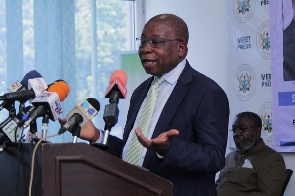 Kwaku Agyeman-Manu, Health Minister
Kwaku Agyeman-Manu, Health Minister
The World Health Organisation declared that COVID-19 was no longer a global health emergency of international concern almost halfway into the year.
Ghana free from sleeping sickness
In January, Ghana eliminated gambiense Human African trypanosomiasis, a life-threatening sleeping sickness transmitted by tsetse flies that causes significant harm to rural populations living in poverty in sub-Saharan Africa.
Funding for Malaria, HIV and TB
The Global Fund allocated $234 million to Ghana to enhance the fight against HIV/ AIDS, Tuberculosis and Malaria by 2025.
The grant was also to help the country build a resilient and sustainable system for health.
Childhood Immunisation Vaccine Shortage
There was a widespread shortage of some vaccines used for routine immunisation of babies from birth to at least 18 months.
Malaria Vaccine Authorization
In April Ghana became the first country in the world to approve a new malaria vaccine from Oxford University, a potential step forward in fighting a disease that kills hundreds of thousands of children each year.
Lassa Fever Outbreak
On 2 May 2023, the Ghana Health Service declared the end of the Lassa fever outbreak in the Greater Accra Region.
The declaration was made after 42 days had elapsed since the last case was discharged, which is twice the maximum incubation period for Lassa fever.
Exodus of Health Workers
July saw the exodus of more experienced nurses in search of greener pastures as about 10,209 nurses, sought clearance with the Ghana Registered Nurses and Midwives Association (GRNMA) Secretariat to leave the country.
Vaccine Manufacturing
President Nana Addo Dankwa Akufo-Addo cut the sod for the construction of the DEK Vaccine Manufacturing Factory at Medie-Kotoku, in the Greater Accra Region.
The factory is expected to manufacture 600 million doses of vaccines annually from 2024.
HIV Self Testing
Ghana launched an HIV Self-Testing (HIVST) programme to empower Ghanaians to check their HIV status in the comfort and privacy of their homes.
GHS Network of Practice
The Ghana Health Service (GHS) introduced the Network of Practice, an initiative that will bring together a group of existing public, private and faith-based health facilities at the sub-district level, and within a catchment area, to be interconnected through a district health centre, where each of the facilities would provide holistic and quality primary healthcare services.
High Cost of Dialysis
In October, the Korle-Bu Teaching Hospital (KBTH) increased the cost of renal dialysis from GHS¢380 to GHS¢765.42. This was met with public outcry.
Mental Health
The World Health Organisation (WHO) expressed grave concern over the state of mental health in Ghana, revealing that nearly 2.4 million Ghanaians may be grappling with various forms of mental illness.
The WHO emphasised the urgent need for collaborative efforts to bolster the country’s faltering mental healthcare system, focusing on both infrastructure and technical support.
To address the increasing rate of mental health issues in the country, President Akufo-Addo announced the inclusion of mental health care in the National Health Insurance Scheme (NHIS) starting in 2024.
“Next year, mental health care will be added to the benefit package on the National Health Insurance Scheme,” he assured.
Finance Minister Ken Ofori-Atta announced the resumption of work on the La General Hospital Project, which had stalled.